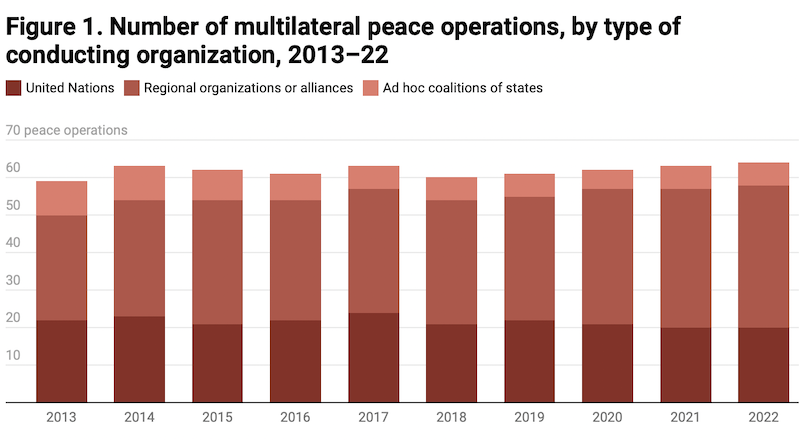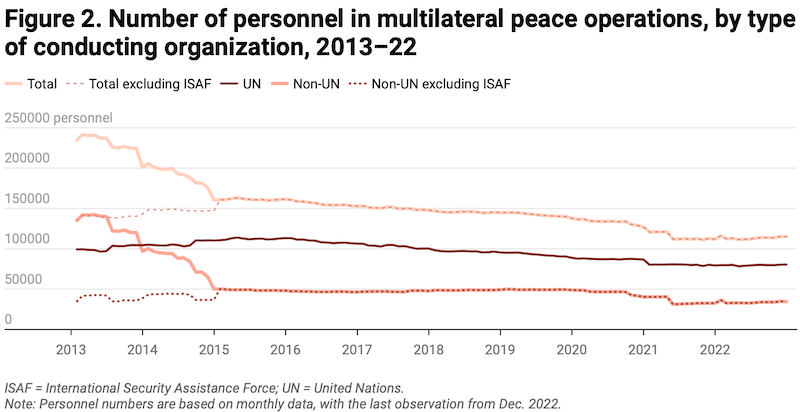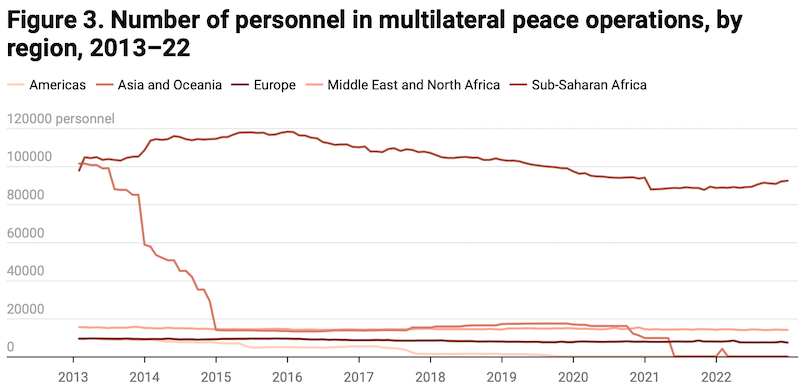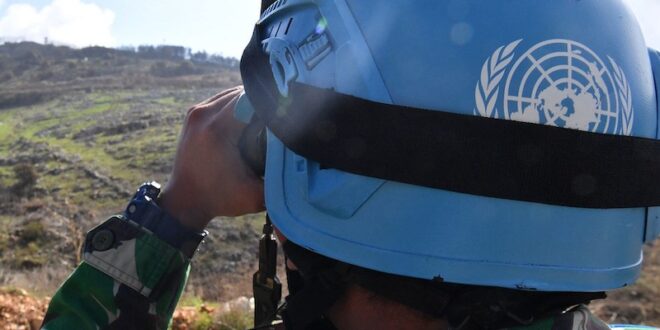To mark the International Day of United Nations Peacekeepers, SIPRI is releasing new data on multilateral peace operations in 2022. This topical backgrounder summarizes the key findings from the new data along with important developments related to multilateral peace operations during the year.
In 2022, 64 multilateral peace operations were conducted in 38 countries/territories around the world. This was more operations than were conducted in any year during the past decade (see figure 1). As in previous years, the UN led the largest number of multilateral peace operations, at 20. Another 38 operations were conducted by different regional organizations and alliances. The other six were conducted by ad hoc coalitions of states. Of the 64 operations, 24 were located in sub-Saharan Africa, 18 in Europe, 14 in the Middle East and North Africa, 5 in Asia and 3 in the Americas.

The number of international personnel deployed to multilateral peace operations around the world increased by 2.79 per cent during 2022, reaching 114 984 by 31 December (see figure 2). The biggest year-on-year changes in personnel numbers were an increase of 3771 (4.2 per cent) in sub-Saharan Africa and a decrease of 541 (–6.7 per cent) in Europe (see figure 3).
New operations were launched in Kazakhstan, Somalia, Guinea-Bissau, the Democratic Republic of the Congo and Ethiopia. The operation in Kazakhstan terminated less than two weeks after its deployment, while the operation in Somalia was essentially a reconfiguration of an existing operation with a new name and mandate. Operations also closed in Ukraine and the Philippines.

Three interconnected developments that were evident in 2022 are likely to influence multilateral peace operations in the coming years: the intensification of geopolitical rivalries between Russia and the West; the deterioration in relations between some operations and their host countries; and a trend towards peace operations being mounted by regional organizations. These are continuations of trends identified earlier, but during 2022 they were intensified by a combination of events, including geopolitical tensions heightened by the war in Ukraine.

New operations in Kazakhstan, Somalia, Guinea-Bissau, the Democratic Republic of the Congo and Ethiopia
Five new peace operations were established in 2022, which together deployed roughly 26 000 personnel (see figure 4 for the largest operations by international personnel deployments).
The Collective Security Treaty Organization (CSTO) Collective Peacekeeping Forces to Kazakhstan operation was established on 6 January 2022 to guard strategic infrastructure and assist law enforcement after demonstrations driven by rising fuel prices escalated into mass protests. Claiming that international terrorist groups had hijacked the protests, Kazakh President Kassym-Jomart Tokayev requested the deployment of CSTO troops. The operation was officially terminated on 19 January 2022, after Tokayev announced that it had completed its mission.
On 1 April 2022 the African Union Mission in Somalia (AMISOM) was officially reconfigured as the African Union Transition Mission in Somalia (ATMIS), with a mandate that includes supporting the national government in the fight against al-Shabab, developing national capacity and supporting the peace process. Both the mandate and the authorized deployments of ATMIS have changed little from its predecessor; the key difference is the inclusion of a transition plan that envisages a four-phased transfer of security responsibilities to the Somali government. Many of the issues that challenged AMISOM remain a concern under ATMIS, including the ongoing al-Shabab insurgency, power struggles among Somali political elites and funding shortfalls.
The Stabilisation Support Mission in Guinea Bissau (SSMGB) was established by the Economic Community of West African States (ECOWAS) on 3 February 2022, following a coup attempt against Guinea-Bissau President Umaro Sissoco Embaló. Deployment of the peace operation began in April 2022.
The East African Community (EAC) established the EAC Regional Force in the Democratic Republic of the Congo (EACRF-DRC) on 20 June 2022. This came in response to the deteriorating situation in the east of the country, where the Congolese armed forces have been fighting a resurgence of March 23 Movement (Mouvement du 23 mars, M23) rebels. M23, which had been dormant for almost a decade, reappeared well armed and equipped in November 2021 and made significant territorial gains in 2022.
The draft concept of operations for the EACRF-DRC is brief and vague in terms of mandate, stating that the joint force should conduct operations to defeat non-state armed groups and support the ‘maintenance of order’ in the DRC, delivery of humanitarian relief to affected populations and demobilization. By the end of the year, Burundi and Kenya had deployed personnel to the operation (see figures 5 and 6 on troop contributions to multilateral peace operations).
The African Union launched the Monitoring, Verification and Compliance Mission (AU-MVCM) in Mekelle, in the Tigray region of Ethiopia, on 29 December 2022. The establishment of the operation was agreed between the government of Ethiopia and the Tigray People’s Liberation Front in their Permanent Cessation of Hostilities Agreement. Political tensions in Tigray spilled over into armed conflict in November 2020 and escalated into a civil war in the months that followed. The monitoring and verification team aims to ensure that the peace agreement is implemented and to prevent ceasefire violations.

Operations close in Kazakhstan, Ukraine, Somalia and the Philippines
Four multilateral peace operations closed in 2022: in Kazakhstan (discussed above), Ukraine, Somalia and the Philippines. At the time of their closure, they deployed a total of roughly 24 000 personnel; however, most of these personnel were with AMISOM and were transferred to ATMIS.
The Organization for Security and Co-operation in Europe (OSCE) Special Monitoring Mission to Ukraine (SMM) officially ended on 31 March 2022, following Russia’s refusal to join the consensus on extending the SMM’s mandate for another year. The peace operation’s closure was a direct consequence of the war in Ukraine; Russia cited the altered security situation in the country in its decision. The operation, which had been active since 2014, was mandated to observe and report on the security situation in Ukraine and to facilitate dialogue among parties to the conflict in the east of the country. At the time of its closure, the SMM was the largest unarmed civilian multilateral peace operation, with 809 international personnel deployed.
AMISOM, which was replaced by the reconfigured operation ATMIS, had been established in 2007 with a mandate to support a national reconciliation congress and to help create the security conditions for humanitarian assistance. Over time, and with a deteriorating security situation on the ground, AMISOM’s mandate evolved to include reducing the threat posed by the al-Shabab insurgency, supporting the Somali security forces and protecting the political process. Formal discussions about ending AMISOM started in early 2021, when both UN and AU assessments recommended its reconfiguration. From 2015 until its replacement, AMISOM was the largest active multilateral peace operation in terms of personnel deployments—a position that ATMIS assumed in 2022 after inheriting AMISOM’s personnel.
On 30 June 2022 the International Monitoring Team (IMT) ended almost two decades of monitoring activities on Mindanao island in the Philippines. Launched in 2004, the operation had the objective of monitoring the implementation of a 2003 ceasefire agreement between the Philippine government and the Moro Islamic Liberation Front (MILF), one of the largest rebel groups in the region. In March 2022 Philippine President Rodrigo Duterte stated that the IMT’s mandate would no longer be extended, although MILF was still in the process of gradual disarmament.
Geopolitical rivalries impact multilateral peace operations
Russia’s full-scale invasion of Ukraine on 24 February 2022 and the ensuing war exacerbated already tense geopolitical relations, particularly between Western countries and Russia. These tensions impacted peace operations in several ways. Most obviously, the war led to the closure of the OSCE’s Special Monitoring Mission to Ukraine. They also complicated dynamics within the UN Security Council, although all UN peace operation mandates were renewed.
A major source of difficulty was the activities of the Wagner Group, a Russian private military company closely tied to the Russian government and implicated in human rights abuses in several countries. In 2022 Wagner was operating in the Central African Republic (CAR) and Mali, where UN peacekeeping operations were also deployed. In the case of CAR, there were disagreements over references in the mandate of the UN Multidimensional Integrated Stabilization Mission in the Central African Republic (MINUSCA) to ‘all parties to the conflict’, which would in theory include the Central African Armed Forces and the Wagner Group, in addition to local armed groups, among perpetrators of human rights abuses.
Moreover, Russia resisted the inclusion of language condemning ‘the use of mercenaries and violations of international humanitarian law and human rights abuses perpetrated by them’—an implicit, but clear, reference to the Wagner Group—in the resolutions renewing the mandates of the UN Multidimensional Integrated Stabilization Mission in Mali (MINUSMA) and MINUSCA in 2022. Despite this, and Russia’s abstention in the votes, the language was retained and the resolutions adopted. The same language had appeared in the UN Security Council resolution renewing MINUSCA’s mandate in 2021.
Deteriorating relations between peace operations and host countries
Relations between some peace operations and host governments reached a new low in 2022. The problem was intensified by public demonstrations demanding the closure of UN peacekeeping operations in the DRC and Mali, which the demonstrators alleged had been ineffective. To some extent, host governments both inflamed and embraced these sentiments.
In eastern DRC, protests left dozens dead in July 2022, including four peacekeepers from the UN Organization Stabilization Mission in the DRC (MONUSCO), culminating in the operation’s intervention brigade opening fire at a border post and killing two civilians. The deterioration in relations resulted in the Congolese government expelling MONUSCO’s spokesperson and discussing how to speed up the operation’s withdrawal.
In Mali, MINUSMA’s spokesperson was expelled for publishing what the government called ‘false information’ about the arrival of Ivorian troops to support the German contingent of the peacekeeping operation, who were arrested and accused of acting as mercenaries. Moreover, although the operation’s mandate was renewed for a further year, the Malian government opposed MINUSMA’s freedom of movement to investigate alleged human rights abuses—a core part of its mandate.
The activities of the Wagner Group were also a point of increasing tension between the governments of CAR and Mali and the UN peacekeeping operations in the two countries. In 2022, two force-contributing countries (Germany and the United Kingdom) announced they would gradually withdraw from MINUSMA due to the Wagner Group’s activities. Moreover, the European Union Training Mission in Mali suspended its training of the Malian armed forces and national guard in April 2022, citing concerns over ‘interference’ and alleged civilian killings by the Wagner Group.
The ‘regionalization’ of peace operations
All five new peace operations established in 2022 were deployed by regional organizations. Particularly in sub-Saharan Africa, regional organizations have launched operations to address crises that have either been neglected by the international community—the rationale for establishing the Southern African Development Community Mission in Mozambique (SAMIM) in 2021—or for which the existing peace operation is considered locally to have an inadequate mandate—part of the explanation for launching the EACRF-DRC in 2022. These regional responses have a stronger focus on military action than on other aspects of peace operations, such as strengthening institutions and protection and promotion of human rights.
Prospects for peace operations
The combination of high geopolitical tensions, particularly around the war in Ukraine, with increasingly challenging relations between missions and their host governments makes the future of a number of peace operations uncertain. MINUSMA is one of them, especially after several countries decided to withdraw from the operation, which was largely due to the presence of the Wagner Group in Mali. A similar chain of events might well be seen in CAR.
It is unlikely that the SMM would have been able to continue operating in Ukraine even had a mandate extension been agreed. However, the termination of the mission following the lack of consensus on its renewal indicates that the format of the OSCE decision-making process might place the future of other OSCE field operations in jeopardy. In June 2022 the office of the OSCE Project Co-ordinator in Ukrainesuffered the same fate as the SMM.
Within the UN Security Council, although all UN operations’ mandates were renewed in 2022, negotiations were more difficult and disagreements deeper. China and Russia did not use their veto powers but abstained in votes on several mandate renewals, including for MINUSCA and MINUSMA. It seems significant that CAR and Mali both refused to condemn the invasion of Ukraine in UN meetings in 2022 and that both countries hosted the Wagner Group.
The notion that peace operations have not properly addressed protracted conflict-related crises has permeated discussions between operations and their host governments and will probably continue to do so. Popular discontent with UN peace operations was used by both the CAR and Malian governments as part of the justification for deploying Wagner Group forces.
The combination of these factors might lead to future peace operation mandates with less priority given to human rights, good governance and democratization.
 Eurasia Press & News
Eurasia Press & News




